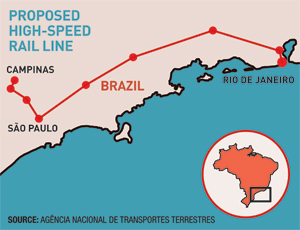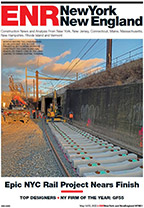Lack of Bids Stymies $21B High-Speed Rail Project in Brazil

A $21.3-billion high-speed-rail project in Brazil has been delayed for a third time after no offers were presented at auction this month. Government officials say they will now modify the proposal in hopes of attracting bidders in a new auction later this year.
The Trem de Alta Velocidade Rio-São Paulo, or TAV, will provide a direct link between two of the country’s largest metropolitan areas. The 510- kilometer line would extend from Rio de Janeiro to São Paulo and terminate at the city of Campinas. The design calls for trains with operation line speeds of 280 km per hour.
The TAV auction was suspended on July 11 when no firms submitted bids by the presentation deadline. It marks the third time the process has been pushed back due to the difficulty of attracting private operators for the project.
The head of Brazil’s National Agency of Terrestrial Transport, Bernardo Figueiredo, says foreign firms had found it difficult to form a consortium with Brazilian companies, a condition of the bidding process. “We had long discussions with investors. However, they were not able to obtain national alliances with contractors, which harmed the bid,” he says. “We are changing this so that the work has the lowest costs possible and attracts the largest number of companies possible.”
According to the ministry, the TAV project now will be split into two stages: first, the securing of a high-speed train operator; second, construction of the line. The contract will be revised to better define the rights and responsibilities of the contractor and to change speed requirements for the train, allowing for a wider array of technology to be used.
“There are two advantages with the new model,” Figueiredo said. “More companies may be eligible, and the time involved can also be reduced because works within the two portions can be done simultaneously.”
If the changes are implemented, the first auction could occur later this year, with a second auction in 2012. The earliest construction start date would be in 2013.
With an estimated six-year construction schedule, only portions of the train line would be in operation before 2019. Brazil initially hoped to have the TAV in operation prior to the 2014 World Cup, but the difficulty of attracting offers to construct the line pushed the target back to the 2016 Olympics.




